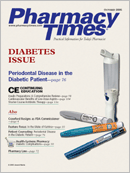Publication
Article
Pharmacy Times
Periodontal Disease in the Diabetic Patient
Author(s):
Periodontal disease is an infectious and inflammatory disease in which progressive destruction of the tissue surrounding and supporting the teeth occurs, ultimately leading to loss of teeth.1 Periodontal disease is associated with poor oral hygiene; it is not confined to diabetic patients. It is, however, a chronic microvascular complication of diabetes and is often referred to as the sixth complication of diabetes. Periodontal disease may exacerbate the course of diabetes and its complications, including vascular disease, neuropathies, and retinopathies.2
The prevalence of periodontitis in diabetics is 17%, as opposed to 9% in nondiabetics.3 Diabetics are at a greater risk for periodontal disease because they are more susceptible to infections and abnormal healing times. Uncontrolled diabetics are more likely to develop periodontal disease than well-controlled diabetics.1 Severe periodontal disease can increase blood sugar, putting diabetics at a greater risk for complications of their disease.1 Thus, it is imperative that diabetics with poor glycemic control as well as periodontal disease be treated aggressively. Treatment involves scaling, root planing, and administration of antibiotics, which usually improves glycemic control. For patients with controlled diabetes, however, periodontal treatment is similar to that for nondiabetics.
Conversely, chronic periodontal disease could predispose a patient to diabetes. Periodontal disease allows bacteria to enter the bloodstream, activating immune cells. The activated immune cells produce cytokines, which can damage or destroy cells in the pancreas responsible for insulin production. As a result, type 2 diabetes may be induced in healthy individuals with no other risk factors for diabetes.4
Complications of Diabetes and Periodontal Disease
One of the reasons why diabetes is such a strong risk factor for periodontal disease is that diabetes compromises the immune system by changing the microflora in the oral cavity. In a healthy oral cavity, polymorphonuclear (PMN) leukocytes act as a first line of defense against inflammation by warding off microorganisms that colonize the area.
When hyperglycemic conditions exist, the number of PMN leukocytes is decreased, allowing for an increased number of destructive chemical mediators. This altered microflora enhances the susceptibility to infection.5
Gingivitis is a bacterial infection of the gums that can occur at any age in the presence of plaque. It is a reversible condition, limited to the gingival tissues. The pain and tenderness associated with gingivitis can discourage eating, which further compromises blood glucose levels, immune response, and wound healing. Gingivitis progresses to periodontal disease, which is irreversible. Progression is more aggressive when blood glucose levels are poorly controlled.5
Insulin resistance and insulin requirements generally increase in the presence of an infection. An infection makes it more difficult for patients to control their blood glucose levels. Insulin doses usually need to be adjusted according to the severity of the periodontal infection. It is critical to control periodontal infections in order to maintain long-term control of diabetes.5
A recent study found that increased serum cholesterol and triglyceride levels in uncontrolled diabetics also may be related to a greater risk for periodontal disease.6
Other Oral Manifestations in Patients with Uncontrolled Diabetes
Many of the general signs and symptoms of periodontal disease are listed in the Table. The following is a listing of oral ailments that may be signals of uncontrolled diabetes:
- Recurrent gingival infections?patients may complain of bleeding of the gums, ulceration, and pain
- Xerostomia (dry mouth)?saliva plays a vital role in maintaining oral health. Patient complaints include dry, cracked lips; cracking of the corners of the mouth; dry tongue; and ulcerations of the oral mucosa.
- Burning mouth or tongue?also taste alterations; may be a complication of diabetic neuropathy8
- Increased incidence of caries? patients with higher A1C levels often have a higher glucose content in their saliva. The glucose combines with plaque to form an acid, which in turn causes the salivary pH to drop. This action eventually causes demineralization of the enamel on the teeth, initiating tooth decay.5
- Candidiasis is a common condition affecting the oral mucosa that often occurs when host immune defenses are low
- Parotid gland enlargement?elevated blood glucose levels may lead to a noninflammatory enlargement of the parotid glands, causing the patient to appear to have "chipmunk cheeks"
The Role of the Pharmacist: Counseling the Diabetic Patient
Strict blood glucose control can prevent or minimize the severity and progression of periodontal disease.5 Patients should be instructed to brush their teeth twice daily with a soft-bristle brush. Alternatively, an ultrasonic brush may be recommended to destroy plaque before it hardens. Daily use of dental floss to clean areas of the teeth and gums that cannot be accessed by a brush also is helpful, as is daily use of an antimicrobial mouth rinse, which will decrease the number of bacteria that cause tooth decay.
Patients should be counseled to schedule frequent dental appointments. It may be necessary for them to see a dentist every 3 to 6 months, depending on their oral health status. Patients should schedule dental appointments early in the morning, after eating breakfast, when blood glucose levels are more stable. Prescribed medications should be taken as usual prior to the appointment. Patients should test their blood sugar before, during, and after an appointment to ensure that blood glucose control is maintained and to prevent a medical emergency.
Smoking plays a large role in the etiology of periodontal disease by increasing inflammation and plaque accumulation. Patients who smoke should be strongly advised to quit.
Antibiotic therapy is often prescribed to control oral infections. Patients should be advised to comply with their antibiotic regimens.
Pain and tenderness in the oral cavity may make it difficult for patients to chew, leading to an inadequate intake of food. Patients should eat smaller, more frequent meals and possibly use a liquid nutritional supplement or multivitamin.
Patients should have their cholesterol and triglyceride levels tested regularly. They should be treated with medications, diet, and exercise if necessary.
Lower oral pH levels have been associated with a lack of nutrients and a higher incidence of dental erosion and cavities. Patients should know that pH strips can be used to assess the acidity of the mouth.
If candidiasis is present, treatment includes topical antifungal medication, as well as tight blood glucose control for 1 to 2 weeks to manage the infection.5
Patients with xerostomia should be aware of the availability of artificial saliva. Glucocorticoids often are prescribed to ease swelling after a dental procedure. Patients should be informed that side effects include an increase in blood glucose levels.
Numerous opportunities exist for pharmacists to counsel patients with diabetes. Education regarding present or potential periodontal disease and its complications is an essential component of counseling the diabetic patient.
Dr. Higgins is a clinical coordinator at Kerr Health Care Center in Raleigh, NC.
For a list of references, send a stamped, self-addressed envelope to: References Department, Attn. A. Stahl, Pharmacy Times, 241 Forsgate Drive, Jamesburg, NJ 08831; or send an e-mail request to: [email protected].







